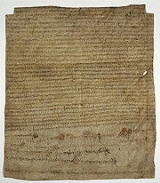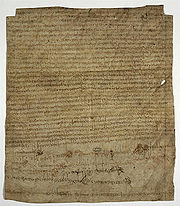
Agilbert
Encyclopedia
Agilbert was the second Bishop of the West Saxon kingdom and later Bishop of Paris. Son of a Neustria
n noble named Betto, he was a first cousin of Audoin and related to the Faronids and Agilolfings
, and less certainly to the Merovingians. His name, the Frankish language equivalent of Æthelberht, has been taken to suggest a link with the royal family of the Kingdom of Kent
.
Agilbert was consecrated as a bishop in Francia before he travelled to Britain
. He arrived in the West Saxon kingdom after the return to power of King Cenwalh of Wessex
, who had been driven out by Penda of Mercia
, either in the late 640s or 650s. He was appointed to succeed Birinus
as Bishop of the West Saxons, or Bishop of Dorchester. Agilbert, according to Bede
's Historia ecclesiastica gentis Anglorum
, had "spent a long time in Ireland for the purpose of studying the Scriptures". His appointment was due to Cenwalh.
From Bede
, it appears that Agilbert did not speak Old English, and it is said that his see was divided in two, with Wine
being given half, because King Cenwalh "tired of his barbarous speech", although this may be mistaken. This insult supposedly led to Agilbert's resignation. He then travelled north to Northumbria
, where he ordained Wilfrid
. He was present at the Synod of Whitby
in 664, where he led the pro-Roman party, but he had the young Wilfrid speak on his behalf.
 Returning to Francia, Agilbert later took part in Wilfrid's consecration as a bishop at Compiègne
Returning to Francia, Agilbert later took part in Wilfrid's consecration as a bishop at Compiègne
. Agilbert became Bishop of Paris between 666 and 668, and hosted Theodore of Tarsus
. He was later invited to return by Cenwalh, to become Bishop of Winchester
, but sent his nephew Leuthhere in his place.
One modern historian, D. P. Kirby, is unsure if Agilbert actually went to Northumbria after being expelled from Dorchester, suggesting it's just as likely that he went directly to the continent.
Agilbert died at some time after 10 March 673, on which date he witnessed Clotilde
's foundation charter for the Abbey of Bruyères-le-Châtel
, and probably between 679 and 690. He was buried at Jouarre Abbey
where his sister Theodechildis was abbess. His fine sculpted sarcophagus
can be seen there in the crypts, as can that of his sister.
Neustria
The territory of Neustria or Neustrasia, meaning "new [western] land", originated in 511, made up of the regions from Aquitaine to the English Channel, approximating most of the north of present-day France, with Paris and Soissons as its main cities...
n noble named Betto, he was a first cousin of Audoin and related to the Faronids and Agilolfings
Agilolfings
The Agilolfings were a family of either Frankish or Bavarian nobility that ruled the Duchy of Bavaria on behalf of their Merovingian suzerains from about 550 until 788...
, and less certainly to the Merovingians. His name, the Frankish language equivalent of Æthelberht, has been taken to suggest a link with the royal family of the Kingdom of Kent
Kingdom of Kent
The Kingdom of Kent was a Jutish colony and later independent kingdom in what is now south east England. It was founded at an unknown date in the 5th century by Jutes, members of a Germanic people from continental Europe, some of whom settled in Britain after the withdrawal of the Romans...
.
Agilbert was consecrated as a bishop in Francia before he travelled to Britain
Great Britain
Great Britain or Britain is an island situated to the northwest of Continental Europe. It is the ninth largest island in the world, and the largest European island, as well as the largest of the British Isles...
. He arrived in the West Saxon kingdom after the return to power of King Cenwalh of Wessex
Cenwalh of Wessex
Cenwalh, also Cenwealh or Coenwalh, was King of Wessex from c. 643 to c. 645 and from c. 648 unto his death, according to the Anglo-Saxon Chronicle, in c. 672.-Penda and Anna:...
, who had been driven out by Penda of Mercia
Penda of Mercia
Penda was a 7th-century King of Mercia, the Anglo-Saxon kingdom in what is today the English Midlands. A pagan at a time when Christianity was taking hold in many of the Anglo-Saxon kingdoms, Penda took over the Severn Valley in 628 following the Battle of Cirencester before participating in the...
, either in the late 640s or 650s. He was appointed to succeed Birinus
Birinus
Birinus , venerated as a saint, was the first Bishop of Dorchester, and the "Apostle to the West Saxons".-Life and ministry:After Augustine of Canterbury performed initial conversions in England, Birinus, a Frank, came to the kingdoms of Wessex in 634, landing at the port of "Hamwic", now in the...
as Bishop of the West Saxons, or Bishop of Dorchester. Agilbert, according to Bede
Bede
Bede , also referred to as Saint Bede or the Venerable Bede , was a monk at the Northumbrian monastery of Saint Peter at Monkwearmouth, today part of Sunderland, England, and of its companion monastery, Saint Paul's, in modern Jarrow , both in the Kingdom of Northumbria...
's Historia ecclesiastica gentis Anglorum
Historia ecclesiastica gentis Anglorum
The Historia ecclesiastica gentis Anglorum is a work in Latin by Bede on the history of the Christian Churches in England, and of England generally; its main focus is on the conflict between Roman and Celtic Christianity.It is considered to be one of the most important original references on...
, had "spent a long time in Ireland for the purpose of studying the Scriptures". His appointment was due to Cenwalh.
From Bede
Bede
Bede , also referred to as Saint Bede or the Venerable Bede , was a monk at the Northumbrian monastery of Saint Peter at Monkwearmouth, today part of Sunderland, England, and of its companion monastery, Saint Paul's, in modern Jarrow , both in the Kingdom of Northumbria...
, it appears that Agilbert did not speak Old English, and it is said that his see was divided in two, with Wine
Wine (bishop)
Wine was a medieval Bishop of London and the first Bishop of Winchester.Wine was consecrated the first bishop of Winchester in 660 and possibly translated to Dorchester around 663...
being given half, because King Cenwalh "tired of his barbarous speech", although this may be mistaken. This insult supposedly led to Agilbert's resignation. He then travelled north to Northumbria
Northumbria
Northumbria was a medieval kingdom of the Angles, in what is now Northern England and South-East Scotland, becoming subsequently an earldom in a united Anglo-Saxon kingdom of England. The name reflects the approximate southern limit to the kingdom's territory, the Humber Estuary.Northumbria was...
, where he ordained Wilfrid
Wilfrid
Wilfrid was an English bishop and saint. Born a Northumbrian noble, he entered religious life as a teenager and studied at Lindisfarne, at Canterbury, in Gaul, and at Rome; he returned to Northumbria in about 660, and became the abbot of a newly founded monastery at Ripon...
. He was present at the Synod of Whitby
Synod of Whitby
The Synod of Whitby was a seventh century Northumbriansynod where King Oswiu of Northumbria ruled that his kingdom would calculate Easter and observe the monastic tonsure according to the customs of Rome, rather than the customs practised by Iona and its satellite institutions...
in 664, where he led the pro-Roman party, but he had the young Wilfrid speak on his behalf.

Compiègne
Compiègne is a city in northern France. It is designated municipally as a commune within the département of Oise.The city is located along the Oise River...
. Agilbert became Bishop of Paris between 666 and 668, and hosted Theodore of Tarsus
Theodore of Tarsus
Theodore was the eighth Archbishop of Canterbury, best known for his reform of the English Church and establishment of a school in Canterbury....
. He was later invited to return by Cenwalh, to become Bishop of Winchester
Bishop of Winchester
The Bishop of Winchester is the head of the Church of England diocese of Winchester, with his cathedra at Winchester Cathedral in Hampshire.The bishop is one of five Church of England bishops to be among the Lords Spiritual regardless of their length of service. His diocese is one of the oldest and...
, but sent his nephew Leuthhere in his place.
One modern historian, D. P. Kirby, is unsure if Agilbert actually went to Northumbria after being expelled from Dorchester, suggesting it's just as likely that he went directly to the continent.
Agilbert died at some time after 10 March 673, on which date he witnessed Clotilde
Clotilde (floruit 673)
Clotilde or Chlodechilidis was the founder of the abbey of Bruyères-le-Châtel. Her charter is one of only eight known original manuscripts to survive from 7th century Francia, among which it is the only private charter. It is a parchment, which is unusual in that most surviving Merovingian...
's foundation charter for the Abbey of Bruyères-le-Châtel
Bruyères-le-Châtel
Bruyères-le-Châtel is a commune in the Essonne department in Île-de-France in northern France.-History:A nunnery was founded at Bruyères-le-Châtel by a noblewoman named Clotilde...
, and probably between 679 and 690. He was buried at Jouarre Abbey
Jouarre Abbey
Jouarre Abbey is a Benedictine abbey in Jouarre in the department of Seine-et-Marne.-History :The Merovingian foundation of Abbess Theodochilde or Telchilde, was founded traditionally in 630, inspired by the visit of St. Columban, the travelling Irish monk who inspired monastic...
where his sister Theodechildis was abbess. His fine sculpted sarcophagus
Sarcophagus
A sarcophagus is a funeral receptacle for a corpse, most commonly carved or cut from stone. The word "sarcophagus" comes from the Greek σαρξ sarx meaning "flesh", and φαγειν phagein meaning "to eat", hence sarkophagus means "flesh-eating"; from the phrase lithos sarkophagos...
can be seen there in the crypts, as can that of his sister.

